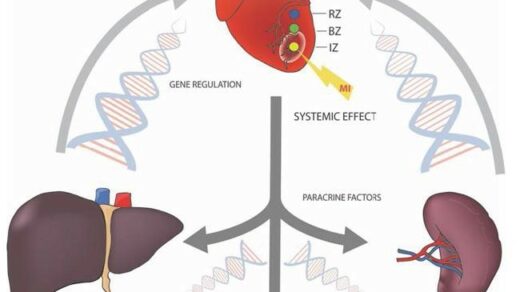Read short summaries of the latest oncology-focused research published in this week’s issue of Oncotarget, Volume 12, Issue 20.

Oncotarget’s Volume 12, Issue #20
New Publications
Cover (Priority Research Paper): Identification of Smurf2 as a HIF-1α degrading E3 ubiquitin ligase
Origin: Rhode Island, United States
Institutions: Brown University, Lifespan Cancer Institute
Quote: “To further investigate the molecular mechanism of HIF-1α destabilization by CDK1 or CDK4/6 inhibitors, we performed a proteomic screen on immunoprecipitated HIF-1α from hypoxic colorectal cancer cells that were either untreated or treated with CDK1 inhibitor Ro3306 and CDK4/6 inhibitor palbociclib.”
Research Paper: A high-throughput customized cytokinome screen of colon cancer cell responses to small-molecule oncology drugs
Origin: Rhode Island, United States
Institutions: Brown University, Lifespan Health System
Quote: “The characterization of soluble mediators as biomarkers for diagnosis and prognosis is of interest in oncology. We utilize the cytokinome to characterize the response of colorectal tumor cell lines to selected small-molecules in oncology as a proof-of-concept dataset with immunomodulatory analyte heat map rankings for drug and cell line combinations.”
Research Paper: Opposing effects of BRCA1 mRNA expression on patient survival in breast and colorectal cancer and variations among African American, Asian, and younger patients
Origin: Rhode Island, United States
Institutions: Brown University, Lifespan Health System, Rhode Island Hospital
Quote: “Breast cancer (BC) and colorectal cancer (CRC) are common and show poor survival in advanced stages. Using The Cancer Genome Atlas (TCGA) computational tool cBioPortal, we evaluated overall patient survival in BRCA1 mRNA-low versus -high cohorts (<−1.29 versus >1.05 SD from mean BRCA1 expression, respectively).”
Research Paper: Pan-drug and drug-specific mechanisms of 5-FU, irinotecan (CPT-11), oxaliplatin, and cisplatin identified by comparison of transcriptomic and cytokine responses of colorectal cancer cells
Origin: Rhode Island, United States
Institutions: Brown University, Lifespan Health System, Rhode Island Hospital
Quote: “Colorectal cancer (CRC) caused over 900,000 deaths worldwide in 2020. A majority of late-stage CRC patients are treated with 5-fluorouracil (5-FU) combined with either irinotecan (CPT-11), oxaliplatin, or both. Despite their widespread use, the mechanisms of efficacy and toxicity of these drugs remain incompletely understood.”
Research Paper: Comparative microsomal proteomics of a model lung cancer cell line NCI-H23 reveals distinct differences between molecular profiles of 3D and 2D cultured cells
Origin: Maryland, Virginia, United States
Institutions: Frederick National Laboratory for Cancer Research, University of Virginia
Quote: “Lung cancer is the leading cause of cancer-related deaths in the USA and worldwide. Yet, about 95% of new drug candidates validated in preclinical phase eventually fail in clinical trials. Such a high attrition rate is attributed mostly to the inability of conventional two-dimensionally (2D) cultured cancer cells to mimic native three-dimensional (3D) growth of malignant cells in human tumors.”
Research Paper: Tissue biodistribution and tumor targeting of near-infrared labelled anti-CD38 antibody-drug conjugate in preclinical multiple myeloma
Origin: Missouri, United States
Institutions: Washington University, Barnes Jewish Hospital
Quote: “Daratumumab (DARA) is an FDA-approved high-affinity monoclonal antibody targeting CD38 that has shown promising therapeutic efficacy in double refractory multiple myeloma (MM) patients. Despite the well-established clinical efficacy of DARA, not all heavily pretreated patients respond to single-agent DARA, and the majority of patients who initially respond eventually progress.”
Research Paper: Multipeptide stimulated PBMCs generate TEM/TCM for adoptive cell therapy in multiple myeloma
Origin: Minnesota, Arizona, United States
Institutions: Mayo Clinic (Minnesota), Mayo Clinic (Arizona)
Quote: “Multiple Myeloma (MM) patients suffer disease relapse due to the development of therapeutic resistance. Increasing evidence suggests that immunotherapeutic strategies can provide durable responses. Here we evaluate the possibility of adoptive cell transfer (ACT) by generating ex vivo T cells from peripheral blood mononuclear cells (PBMCs) isolated from MM patients by employing our previously devised protocols.”
Research Paper: NEDD8-activating enzyme inhibition induces cell cycle arrest and anaphase catastrophe in malignant T-cells
Origin: Ohio, California, Oregon, United States
Institutions: The Ohio State University, City of Hope Comprehensive Cancer Center, Oregon Health and Science University
Quote: “Peripheral T-cell lymphoma (PTCL) is characterized by poor outcomes. We and others have shown that targeting the NEDD8-activating enzyme (NAE) with an investigational inhibitor pevonedistat deregulates cell cycle and mitosis in lymphoma and leukemia. Here, we report that PTCL is characterized by increased rate of chromosomal instability.”
Research Paper: Safety and initial efficacy of ablative radioembolization for the treatment of unresectable intrahepatic cholangiocarcinoma
Origin: Florida, United States
Institution: Mayo Clinic (Florida)
Quote: “This study aimed to evaluate the initial safety and efficacy of ablative radioembolization for the treatment of unresectable iCCA [intrahepatic cholangiocarcinoma], in which >75% of the tumor was treated with >190 Gy Medical Internal Radiation Dose (MIRD). An analysis of radioembolization outcomes was performed with respect to tumor blood supply characteristics.”
Review: Switching Hedgehog inhibitors and other strategies to address resistance when treating advanced basal cell carcinoma
Origin: Texas, United States
Institutions: The University of Texas MD Anderson Cancer Center, University of Texas McGovern Medical School, US Dermatology Partners, Baylor College of Medicine
Quote: “This review examines HHI [hedgehog inhibitor] resistance, its underlying mechanisms, and methods of management for patients with advanced BCC [basal cell carcinoma].”
Editorial: Fibrocytes in primary myelofibrosis
Origin: Miyazaki, Japan
Institution: University of Miyazaki
Quote: “More than 80% of PMF [primary myelofibrosis] patients carry mutations that activate the JAK-STAT signaling pathway; about 50%, 25–30%, and 8% of PMF patients harbor JAK2V617F mutations, CALR exon9 frameshift mutations, and myeloproliferative leukemia virus oncogene (MPL) mutations, respectively.”
Research Perspective: Ras-p53 genomic cooperativity as a model to investigate mechanisms of innate immune regulation in gastrointestinal cancers
Origin: Florida, New York, United States
Institutions: University of Miami Miller School of Medicine, Sylvester Comprehensive Cancer Center, Memorial Sloan Kettering Cancer Center,
Quote: “Despite increasingly thorough mechanistic understanding of the dominant genetic drivers of gastrointestinal (GI) tumorigenesis (e.g., Ras/Raf, TP53, etc.), only a small proportion of these molecular alterations are therapeutically actionable. In an attempt to address this therapeutic impasse, our group has proposed an innovative extreme outlier model to identify novel cooperative molecular vulnerabilities in high-risk GI cancers which dictate prognosis, correlate with distinct patterns of metastasis, and define therapeutic sensitivity or resistance.”
Click here to read Oncotarget’s Volume 12, Issue #20.
YOU MAY ALSO LIKE: More Oncotarget Videos on LabTube
—
Oncotarget is a unique platform designed to house scientific studies in a journal format that is available for anyone to read—without a paywall making access more difficult. This means information that has the potential to benefit our societies from the inside out can be shared with friends, neighbors, colleagues, and other researchers, far and wide.
For media inquiries, please contact media@impactjournals.com.



